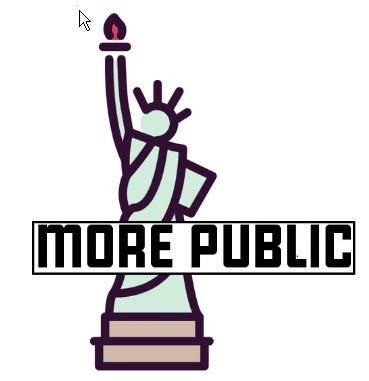Introduction to More Public
This is the end game for my civic practice – a better life, save the planet
This is my civic mantra – my civic pedagogy: More Love. More Power. More Public. Or, to put it this way – “We need to practice more love in order to build more power in order to govern to grow and evolve our public sector. We do all this in order to create a better life for ourselves and our children and to save the planet from destruction. Business won’t do this. Nonprofits or charities can’t do it.
The end game for my civics is to celebrate, protect, defend, and extend the public sector. This includes our public services as well as our public stuff – our public assets. So, just think of everything that has the word “public” in front of it.
Public parks. Public schools. Public transportation. Public health. Public housing. Public libraries.
But also think of our air, our water, our culture, our airwaves, and our laws as all part of a vast public ecosystem.
This includes the millions of people who make and deliver these services and who tend and grow these spaces.
You often hear the business sector boast that they are the “job creators” and deserve all kinds of respect and public subsidies – tax breaks, special care and handling, and often, billions of public dollars to help them do their thing. No, my friends, it is the PUBLIC SECTOR that makes the private sector possible. All commerce, all for profit activities and outputs rests solidly on the foundation of a healthy and robust public sector. Literally. All commerce takes place inside places like towns and cities which are maintained by the public. All commerce is bound and protected by public laws enforced by public courts and patrolled by public watchdogs and enforcers. All commerce is connected by roads built and maintained by the public. Every penny earned on the Internet, every email ever sent via the Internet, all knowledge (or nonsense) on the Internet is a function of the public’s investment in the World Wide Web – the technology that made it possible and the infrastructure that keeps it running.
Public assets like the air we breathe, the water we drink, and the essential culture we share are all public assets that are not owned – or should not be owned – by private parties.
Keep reading with a 7-day free trial
Subscribe to Tom Tresser's "CivicNotes" Substack to keep reading this post and get 7 days of free access to the full post archives.





